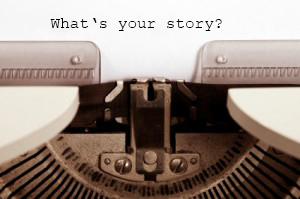Readers don’t give a shit about you – unless you show them how YOU are like THEM
Stephen Elliott, a ridiculously talented author who I admire greatly (adore), was interviewed recently by The Believer Logger. The piece is titled “The Reader Does Not Give A Shit About You.”
It got me thinking.
Yes, yes yes yes yes. He is dead on.
Readers don’t care if we writers live or die. But that can be confusing.
Great writers share parts of themselves to connect to their readers. That’s the stuff that gets people personally invested in our characters, in our novels. So how do we reach out to people who don’t care about us?
Well, why do you read?
To be entertained. To learn. To help yourself. To see you’re not alone.
Readers don’t give a shit about you – unless you show them how YOU are like THEM.
Our commonalities draw us together.
Any time you make your reader nod her head in agreement – Yes, I’ve been there. Or, Oh, good. It’s not just me. – you connect in a way that’s lasting. It will stay with the reader long after she’s finished your book.
We love The Lord of the Rings and Harry Potter because huge parts of us identify with an underdog. We know what it’s like to try to do the right thing, despite magnificently terrifying odds.
Anna Karenina is a classic because people know, with intimate precision, how it feels to want something or someone so badly, we’d give up everything in exchange.
Mind you, it’s not just plot that makes these books timeless. It’s damn good writing. Writing that sucks us inside the walls of the wizarding world or brings to life high society in 1870s Russian.
How?
Writers need to learn the kinds of details that effectively “show” readers instead of telling. The stuff that helps them see the wisp of blond hair curling toward her chin when her gaze falls to the ground. Feel the chill of a morbidly gray morning in November while hunting pheasant. Or suffer the metallic taste of irony when she first learns her lover is cheating with her sister.
It’s our job as writers to give readers a reason to care about our characters and what happens to them. Here are a handful of details that help a writer “show.”
- Character details (moving, thinking, feeling, talking), moment by moment description of action, get inside your characters’ heads, inner thoughts, opposing perspectives.
- Setting details (smell, touch, taste, hear, see), create a living, breathing picture.
- Important object details (color, size, texture, temperature), compare objects to something everyone is familiar with.
- Non-narrative details (quotes, statistics, facts, anecdotes, definitions).
Books have an advantage over movies and TV because they let readers inside characters’ heads. Beginning writers often forget this. But it’s critical to reveal characters’ inner thoughts and feelings. To show different perspectives by getting inside the minds of people from different times, places and backgrounds. Good writers will also reveal characters’ personalities, thoughts and feelings through dialogue.
Slowing down and adding details is the difference between editorializing and writing rich.
 A crude example: Walk into a class of third-graders and write on the board, “I have a dog.” Then tell the students to draw a picture of a dog. Each picture would be completely different. And vastly different from the dog you imagine in your head. The solution lies in the details.
A crude example: Walk into a class of third-graders and write on the board, “I have a dog.” Then tell the students to draw a picture of a dog. Each picture would be completely different. And vastly different from the dog you imagine in your head. The solution lies in the details.
Example number two: “Yesterday, my husband brought me home some cookies. They tasted good.” Forget that these sentences are boring and poorly constructed. Just think about what you would ask in order to learn more. Why did he bring me cookies? What kind were they? Did they have frosting? Did he make them? Did I share?
Once writers know how to ask the right questions, they become more adept at deleting the irrelevant to make way for what is more specific and concrete.
• • •
Details help to create a picture in the mind of a reader. But how you go about adding them can make a huge difference – the difference between smelling the chlorine by the pool and feeling your head submerge in the icy water.
- Use descriptions of others to reveal something about the main character. “His thick black hair reminded me of my own, when I was pregnant with my oldest. Back before the cancer treatment left me with a threadbare scalp.”
- Bring description at unexpected moments. “The sky was metallic and grainy that night, as though sheaths of rain could come down any second. As she reached for the shutters, I could see where years of self-cutting scarred her forearms like some sort of bold tattoo.”
- Show details during conversation. “I left him,” she said, crossing her thin arms defiantly, wrinkling the fine lace and white satin of her wedding gown. “Don’t try to talk me into going back.”
- Add a bit of character detail when describing something important. “She had a nasty habit of biting her full, pink lips when she was uncertain, which happened frequently when he was around. He noticed – and he liked it.”
- Add detail while another character’s action is being described. “She watched him moving to the dance floor with envy. He was so graceful on his feet, while she tripped merely walking across the ballroom in her stilettos.”
How do you add detail to your work?
***
RebeccaTDickson.com celebrates one year in biz on December 2nd. We’re partying Becky-style that day (and night). I’ve got a special something-something for folks on Twitter and Facebook, and something FUCK-YEAH exclusive for my subscribers. Get on the list, dahhhhlings. Details will hit your inbox on November 22nd.
Subscribe and get awesome. (Box on the upper right.)

